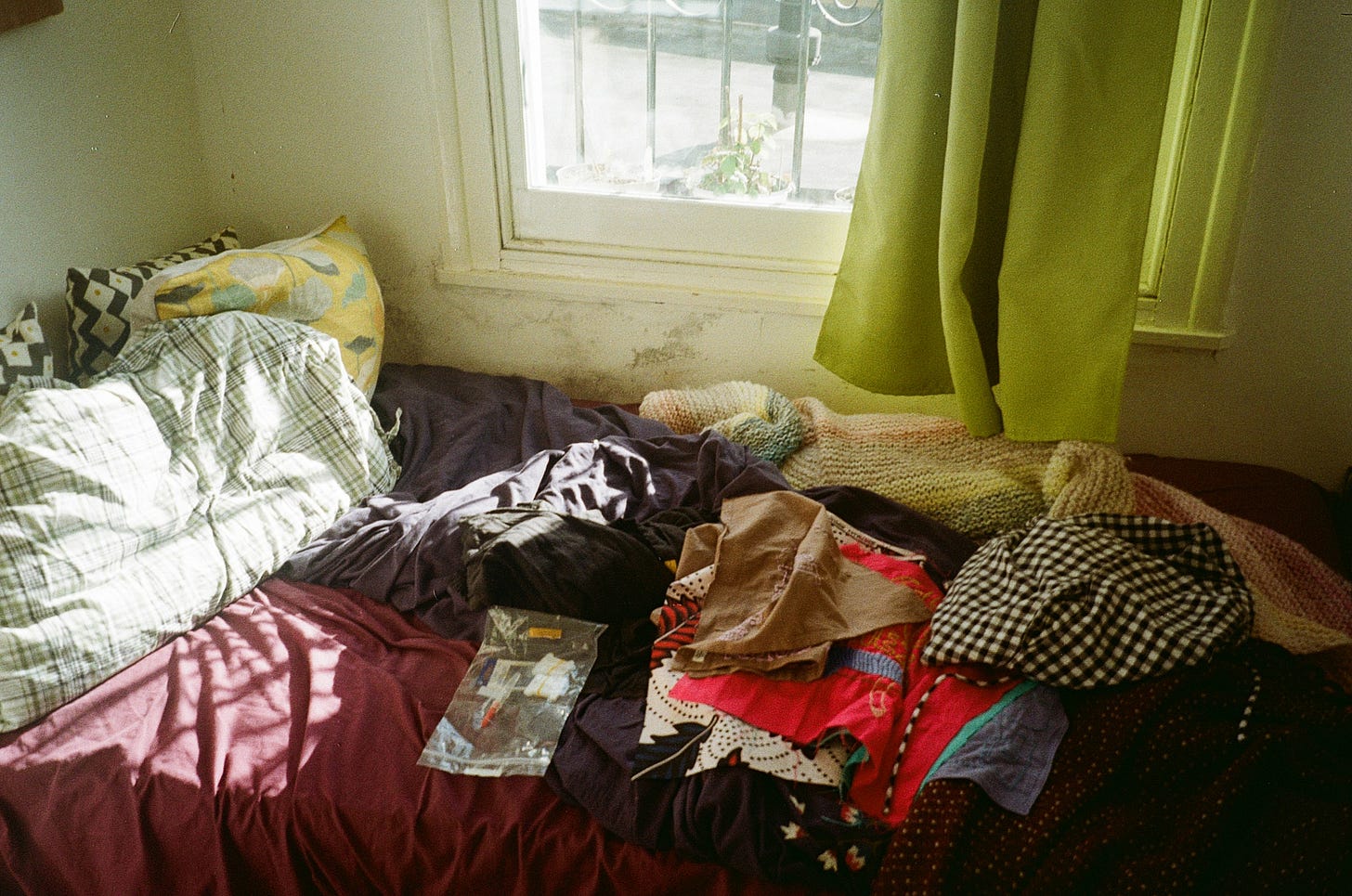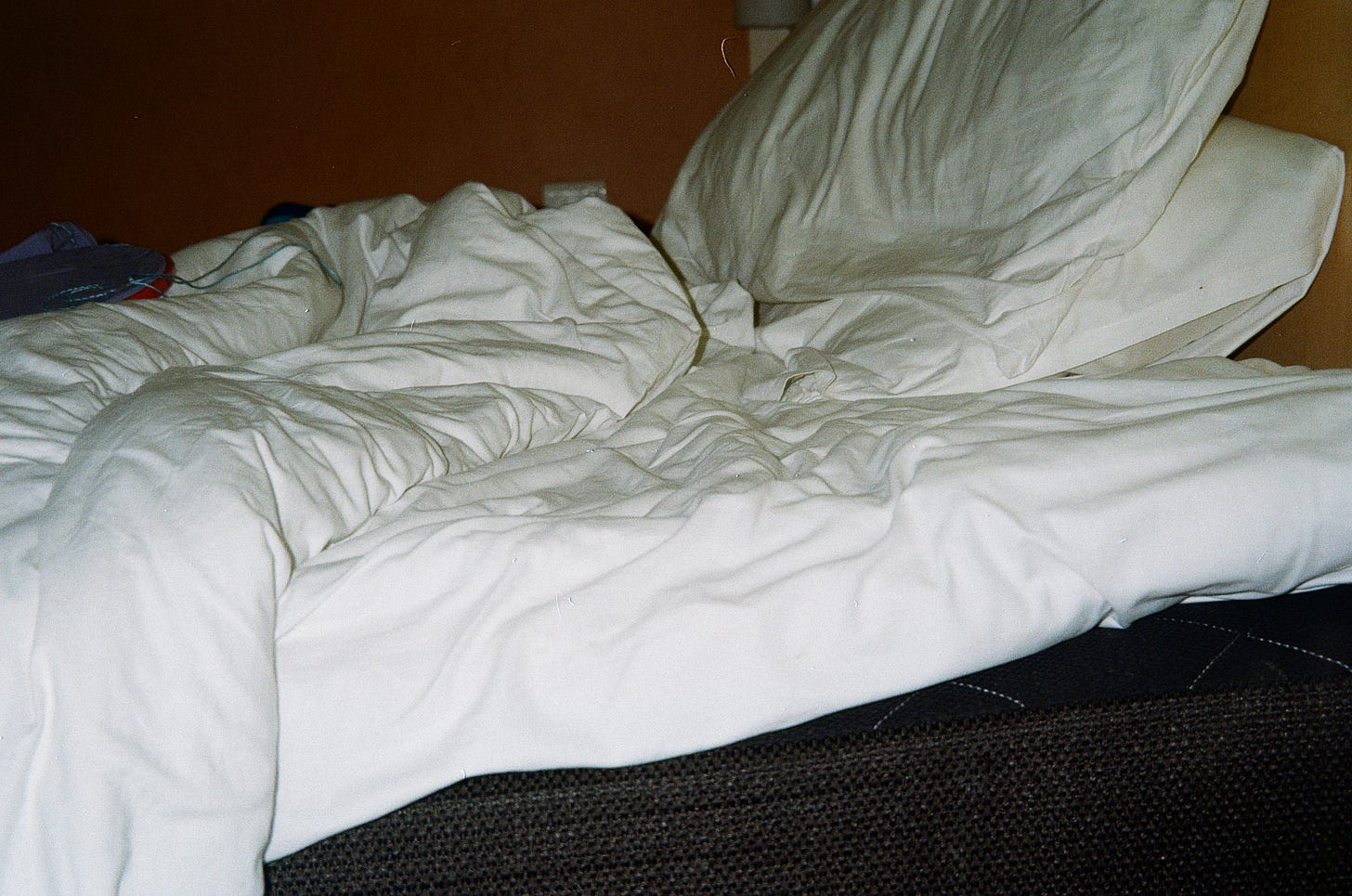004: Jamila Prowse: Coming Offline
Jamila Prowse talks breaking up with the internet, the adage of the Bebo homepage, and a hope for holding commune with loved ones IRL.
For the latest instalment of Discontented, visual artist, writer, and friend Jamila Prowse discusses her proximity to the internet through her lens of disability and neurodivergence, exploring adolescent screen-time, digital friendship, and community beyond technology.
I’m trying to break up with the internet. Turning my back on a seventeen year relationship isn’t necessarily straightforward and despite attempting to end it at various points, it took having another unpleasant online experience for me to finally walk away.
I’ve spent a lot of time in my life thinking about harmful relationships, but it was another thing altogether to admit that a tool that had been so integral to my life might also be following a pattern of toxicity. Thinking back on some of my earliest online memories, a framework of addiction was always present. As a household, we were relatively late getting online. We missed the early You’ve Got Mail days; characterised by a naive curiosity of being connected to strangers all around the world. Unable to afford a computer, my first interaction was with an offline rental – back in the days where a computer could be delivered to your home for a temporary period. Unplugged from the internet, the most I could do was sit and play an in-built game where a cat burglar would jump from rooftop to rooftop, with cats in a swag bag.
We finally got online around 2007, when my grandma bought big, bulky Dell computers, complete with whirring, overheated hard drives, for my mum and my aunt. At secondary school for the first time at the age of twelve, a swift romance with social media seemed inevitable. After all, many of my classmates had long been online, and even had access to mobile phones. Enamoured with my computer, I remember running the whole half hour distance from school to home so I could get on MSN in time to talk to my crush. There was an immediate and unavoidable headiness to being online. Hidden safely behind a screen, I could be bolder, say the things I was too shy to articulate in person. The ultimate aim was to featured in someone’s MSN profile name – surrounded by emoji hearts – an indication of an undeniable bond.
“Being online only broadened the remit of social possibilities, with dynamics playing out through Bebo, enabling people to create personal homepages through which they could rank the order of their friends”
Social dynamics and interactions have always been difficult for me to navigate. At primary school, I couldn’t get my head around the structures of the playground, and often found engaging in group play to be confusing and hard to follow. I couldn’t wrap my head around the rules that were created by my peers and the hierarchies those rules were indicative of. Moving up to “big school” this confusion didn’t ease; with the stakes being raised by our newfound independence. A whole new set of rules seemed to emerge, and the way I learned to survive was to observe and mirror the behaviours of the people around me. Being online only broadened the remit of social possibilities, with dynamics playing out through Bebo, enabling people to create personal homepages through which they could rank the order of their friends. When I look back on those years, they were characterised by my mum regularly finding me hunched over on the floor underneath the computer, hysterically crying. Always at risk of saying the wrong thing, of misinterpreting a situation, social life was even harder to navigate when a person’s facial expressions weren’t visible.
Being deeply impacted by online life as a teenager isn’t out of the ordinary; and yet well into my late 20s many of the most disruptive periods of my life were refracted through technology, as I continued to fall out with people over text and social media. Last autumn, at the age of twenty nine, I sat in a familiar position, phone glued to my hand, having a panic attack after a disagreement with someone in a virtual space. Sensing a pattern that had dominated half of my life, my mum encouraged me to reconsider some of my most difficult experiences and see the common presence of a screen. Understandable as a teenager, but was it normal for my emotional life as an adult to be so tied to and dominated by the internet?
“Finding power and self preservation in holding some things back has allowed me to step away from the prevalent anxiety and uncertainty of being online”
It wasn’t until my late 20s that I realised I might be autistic. Re-contextualising my past social interactions through the lens of neurodivergency has helped me to understand the challenges I’ve faced socially. Amongst my most prevalent autistic traits is a difficulty to regulate my emotions, which combined with my tendency towards tunnel vision and finding it hard to read social cues, makes the faceless, addictive quality of online spaces a perfect storm. Knowing the pitfalls of the internet, coming offline still felt like a near impossible task, given how intrinsic it had become to life over close to two decades.
In the past four years, I have come to know my bed intimately. With varying health issues, including but not limited to pervasive autistic burnout, I have been intermittently bed bound and spent more cumulative time in bed than outside of it. Unable to socialise in person, I became heavily reliant on technology in order to have a social life. Online spaces, for the first time, began to act as a lifeline. I was able to connect with other disabled artists and form communities. To this day, many of my closest relationships are with people I’ve never met IRL. At the same time as coming off social media at the end of last year, I found myself bed bound once again as a result of new health issues, and simultaneously unable to use my phone. Since January, socialising has been an absented part of my day to day life. Developing chronic back problems due to spending so much time in bed means texting has become a painful endeavour, while emerging digestive problems have been so debilitating they’ve decreased my capacity for regular communication. Previously, the thought of going weeks without talking to another person other than my mum (who is my full time carer) would’ve sounded unbearable. And yet, as my health problems have become more consuming, demanding an increasing amount of my attention, I’ve adjusted to the reality of a restricted life. Is it strange to have gone months without talking to people I used to be in regular contact with? For some of my closest friends to be completely unaware of my new health conditions? In many ways yes, but as the pressures of adult life pull people into increasing insularity, I know I’m not alone in stepping away from my phone in order to attend to my interiority.
Perhaps more complicated, is the fact that my professional life is inextricably tied to being online. Working in a public field, as an artist and writer, we are often told that our livelihoods are dependent on us maintaining an online presence. In the summer of last year, struggling to make ends meet, I started to expand my internet persona in the hopes of building new financial avenues. Filming became an integral part of quotidian life; documenting every private moment, from breakdowns to weeks spent in bed, before editing and uploading them as videos to a newly launched YouTube channel. A few months in, when I started to have problems online again, I looked more critically at my online presence and realised how much of my personal information was readily available for people to access. Though with the prevalence of doxxing, none of us are protected from having our private details shared online, as someone in the public sector there was countless information about where I worked, studied and lived. And as I decided to come offline and create healthier boundaries around my public and private life, I confronted how difficult it is to remove personal information once it's a part of the online domain.
“… as the pressures of adult life pull people into increasing insularity, I know I’m not alone in stepping away from my phone in order to attend to my interiority”
Forever attempting to find ways to move beyond my social isolation, prior to YouTube I would regularly use my social media to share diaristic confessions. As a writer, I’ve always leant into the personal, and so it didn’t feel like a big leap to write lengthy Instagram captions about the innermost workings of my mind. Here, I’d share about my disability, mental health and suicidal ideation, often feeling greater connection and solidarity when people would leave comments detailing their shared experiences. Now offline, I am less connected, I am quieter. Sometimes I go full days without speaking to anyone else. And yet I’ve been able to reestablish personal boundaries around my privacy. To realise I don’t owe public confessions to strangers. To let my voice enter the outside world through my art and writing, without a need to give all of myself away. Finding power and self preservation in holding some things back has allowed me to step away from the prevalent anxiety and uncertainty of being online. Now, while I can recognise the utility of the internet, particularly in terms of organising and connectivity, I can also understand it as a space which, for me, is personally detrimental. Instead of finding community through technology, I hold out hope for a day – no matter how brief or temporary – where I might be able to hold commune with loved ones IRL, acknowledging that while my disability makes this rare, it is a safer way for me to find connection.









Just listened to the article voice over for this excellent piece' 004: Jamila Prowse: Coming Offline' - powerful, thought provoking and will now play it again!